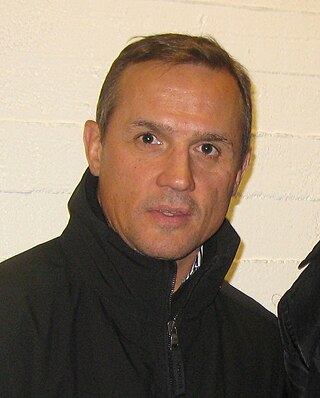Related Research Articles

The 1984 Winter Olympics, officially known as the XIV Olympic Winter Games and commonly known as Sarajevo '84, were a winter multi-sport event held between 8 and 19 February 1984 in Sarajevo, Yugoslavia. It was the first Winter Olympic Games held in a Slavic language-speaking country, as well as the only Winter Olympics held in a communist country before the 2022 Winter Olympics in Beijing, China. It was the second consecutive Olympic Games held in a communist country, after the 1980 Summer Olympics in Moscow, Russian SFSR, Soviet Union.

The 1952 Winter Olympics, officially known as the VI Olympic Winter Games and commonly known as Oslo 1952, were a winter multi-sport event held from 14 to 25 February 1952 in Oslo, the capital of Norway.

Stephen Gregory Yzerman is a Canadian former professional ice hockey player currently serving as executive vice president and general manager of the Detroit Red Wings, with whom he spent all 22 seasons of his NHL playing career. Widely regarded as one of the greatest players of all time, he is a Detroit sports icon and a member of the Hockey Hall of Fame. After his retirement as a player, he served in the front office of the Red Wings, and then as general manager of the Tampa Bay Lightning, while also being executive director for Team Canada in two Olympics.

Peggy Gale Fleming is an American former figure skater. She is the 1968 Winter Olympic Champion in the ladies' singles, being the only American gold medalist at these Games, and a three-time World Champion (1966–1968) in the same event. Fleming has been a television commentator in figure skating for over 20 years, including at several Winter Olympic Games.

The 1998 Winter Olympics, officially known as the XVIII Olympic Winter Games, was a winter multi-sport event held in Nagano, Japan, from 7 to 22 February 1998. Twenty-four nations earned medals at these Games, and fifteen won at least one gold medal; forty-eight countries left the Olympics without winning a medal. Competitors from Germany earned the highest number of gold medals (12) and the most overall medals (29). With 10 gold medals and 25 overall medals, Norway finished second in both categories. Denmark won its first – and as of 2018 only – Winter Olympics medal, while Bulgaria and the Czech Republic won their first Winter Games gold medals. Azerbaijan, Kenya, Macedonia, Uruguay, and Venezuela competed for the first time, but none of them won a medal.
The 1992 Winter Olympics, officially known as the XVI Olympic Winter Games, were a winter multi-sport event held in Albertville, France, from February 8 to 23. A total of 1,801 athletes representing 64 National Olympic Committees (NOCs) participated in 57 events from 12 different sports and disciplines. In a break from tradition, the medals were primarily made of crystal rather than metal: gold, silver, or bronze was used only on the border.
The 1988 Winter Olympics, officially known as the XV Olympic Winter Games, was a winter multi-sport event held in Calgary, Canada, from 13 to 28 February 1988. A total of 1,423 athletes representing 57 National Olympic Committees (NOCs) participated in 46 events from 10 different sports and disciplines. Five new events were contested at these Games—men's and women's Super G in alpine skiing, team events in Nordic combined and ski jumping, and women's 5000 metres in speed skating—and two events returned to the program—men's and women's combined in alpine skiing.
The 1984 Winter Olympics, officially known as the XIV Olympic Winter Games, was a winter multi-sport event held in Sarajevo, Yugoslavia, from 8 to 19 February 1984. A total of 1,272 athletes representing 49 National Olympic Committees (NOCs) participated in 39 events from 10 different sports and disciplines. First time NOCs to enter were Egypt, Monaco, Puerto Rico, Senegal, and British Virgin Islands.
The 1972 Winter Olympics, officially known as the XI Olympic Winter Games, was a winter multi-sport event held in Sapporo, Japan, from 3 to 13 February 1972. A total of 1,006 athletes representing 35 National Olympic Committees (NOCs) participated in 35 events from 10 different sports and disciplines.
The 1952 Winter Olympics, officially known as the VI Olympic Winter Games, took place in Oslo, Norway, from 14 to 25 February 1952. A total of 694 athletes representing 30 National Olympic Committees (NOCs) participated in the Games, taking part in 22 events from 6 sports.

Ice hockey tournaments have been staged at the Olympic Games since 1920. The men's tournament was introduced at the 1920 Summer Olympics and was transferred permanently to the Winter Olympic Games program in 1924, in France. The women's tournament was first held at the 1998 Winter Olympics.

Madagascar competed in the 2006 Winter Olympics in Turin, Italy. The country's participation at the Games marked its Winter Olympics debut, although it had competed in the Summer Olympics since 1964. The delegation consisted of a single alpine skier, Mathieu Razanakolona, who did not win any medals.
These are the team rosters of the nations that participated in the men's ice hockey tournament of the 2006 Winter Olympics. Each team was permitted a roster of 20 skaters and three goaltenders.

Isabelle Charest is a Canadian athlete and politician. A short track speed skater who competed in the 1994 Winter Olympics, the 1998 Winter Olympics, and the 2002 Winter Olympics, she was elected to the National Assembly of Quebec in the 2018 provincial election as a member of the Coalition Avenir Québec.
Peter Duncan is a Canadian former alpine skier who competed in the 1964 Winter Olympics and 1968 Winter Olympics.
References
- ↑ Evans, Hilary; Gjerde, Arild; Heijmans, Jeroen; Mallon, Bill; et al. "Dan Doll Olympic Results". Olympics at Sports-Reference.com. Sports Reference LLC. Archived from the original on 18 April 2020. Retrieved 6 April 2020.